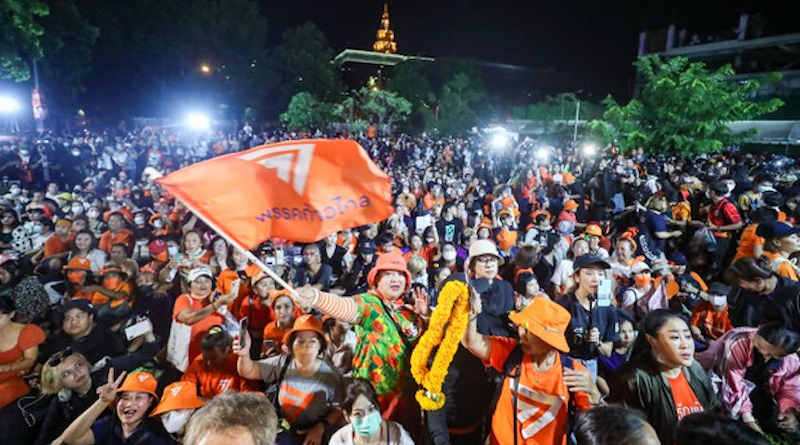Thailand: Opposition Leader Falls Short In First Round Of Voting For PM
By BenarNews
By Nontarat Phaicharoen
Pita Limjaroenrat failed to win the required parliamentary votes to become Thailand’s prime minister in his initial bid for the post Thursday, but promised that his progressive party would change strategy for the next round of voting.
Pita and his Move Forward Party fell well short of the 375 votes needed to clinch power – a blow for his pro-democracy coalition trying to unseat an administration with deep military ties that has ruled Thailand for almost a decade.
Despite being backed by an eight-party alliance, Pita’s attempt to lead Thailand was thwarted by mass abstentions and few votes from the pro-royal Senate whose members. He also faces a pair of legal complaints that could lead to him being dismissed as an MP.
His party, whose campaign platform called for reforming laws shielding the monarchy, was the top vote getter in the May 14 general election where opposition parties trounced pro-military and pro-royalist ones.
“We accept the result but won’t yield,” Pita, 42, told reporters after the first round of voting.
Pita, the only candidate nominated on the first day of the voting for PM, received 324 votes (including just 13 of the 249 members of the upper house Senate), while 182 lawmakers voted against him and 199 abstained. Dozens of lawmakers were no shows at Thursday’s crucial vote.
“There was great pressure on the senators that more than 40 were absent. We will find a strategy to collect more votes for the next round,” Pita said.
In the days leading up to the parliamentary voting, some members of the Senate, who were appointed during the five years of junta rule following a 2014 coup, had signaled their distaste for Pita’s campaign pledge to do away Lèse-Majesté, a strict law against royal defamation.
“Whatever, we’ve promised the people, we will follow suit, heading for the second round,” said the Harvard-educated Pita. “[We] understand, appreciate the 13 senators who voted as you previously promised to the people.”
Late Thursday, House Speaker Wan Muhamad Noor Matha announced the vote tally and set July 19 for the next round of voting. Pita, who actually needs the support of 375 MPs because one senator left office, can be renominated for the post.
“Pita did not have sufficient votes to meet the required half of the legislature, therefore Pita fails to become prime minister,” the house speaker said.
Thursday’s outcome was not a surprise, according to one political analyst.
“There was an observation before the voting that some senators publicly convinced others to change or confused them from supporting the nominee over fear of retribution,” Thannapat Jarernpanit, a professor at Pibulsongkram Rajabhat University, told BenarNews. “For whatever reason, there was a creation of a climate of fear in the parliament.”
Pita was the leading candidate for PM on Thursday because his party won 151 parliamentary seats in the election, outpacing the favored opposition Pheu Thai Party, which came in second with 141. The six other members of the coalition pushed Pita’s support to 312.
Under the constitution, any party with at least 25 seats in the lower house can nominate a prime minister candidate, but none did.
While the MPs congregated inside the parliament for the vote, hundreds gathered outside in support of Pita.
“I felt like someone was squeezing my throat watching the voting – it was stressful mentally,” a woman, who asked to be identified only as Minnie for privacy reasons, told BenarNews. “I hope our wish comes true in the future.”
Legal complaints
The two legal complaints against Pita gathered steam on the eve of the vote.
On Wednesday, the Constitutional Court said it had accepted a case from the Election Commission that recommended he be disqualified as an MP over a complaint that he applied to run for office while owning shares of a now-defunct media company – a violation of election laws.
It also said it had received a separate complaint filed by lawyer Teerayuth Suwanakesorn against Pita and Move Forward’s plan to reform Article 112 – the Lèse-Majesté law– of the criminal code. Teerayuth’s petition alleges that the proposal could be deemed as an attempt to “overthrow the constitutional monarchy or the democratic regime with the king as the head of the state.”
In the weeks before Thursday’s vote, senators and pro-royalist lower house members frequently cited Pita’s push to amend the law as a red line that must not be crossed.
The issue was front and center during Thursday’s parliamentary debate.
Bhumjaithai MP Chada Thaiseth said the country would erupt in violence if the legislation were changed.
“If you allow people to criticize the monarchy without a law to protect the institution, there will be gunfights,” he said. “How about I propose a law to allow people to shoot those insulting the monarchy?”
Satra Sripan, a lawmaker from the Thai United Nation Party – the party of caretaker Prime Minister Prayuth Chan-o-cha – said amending Article 112 would cause a rift in Thai society.
“How can people live among the ruins? There is no benefit from this,” Satra told parliament.
Earlier this week, Prayuth, who became prime minister after leading a 2014 military coup, announced that he was leaving politics.
Wilawan Watcharasakwej in Bangkok and Kunnawut Boonreak in Chiang Mai, Thailand, contributed to this report.

